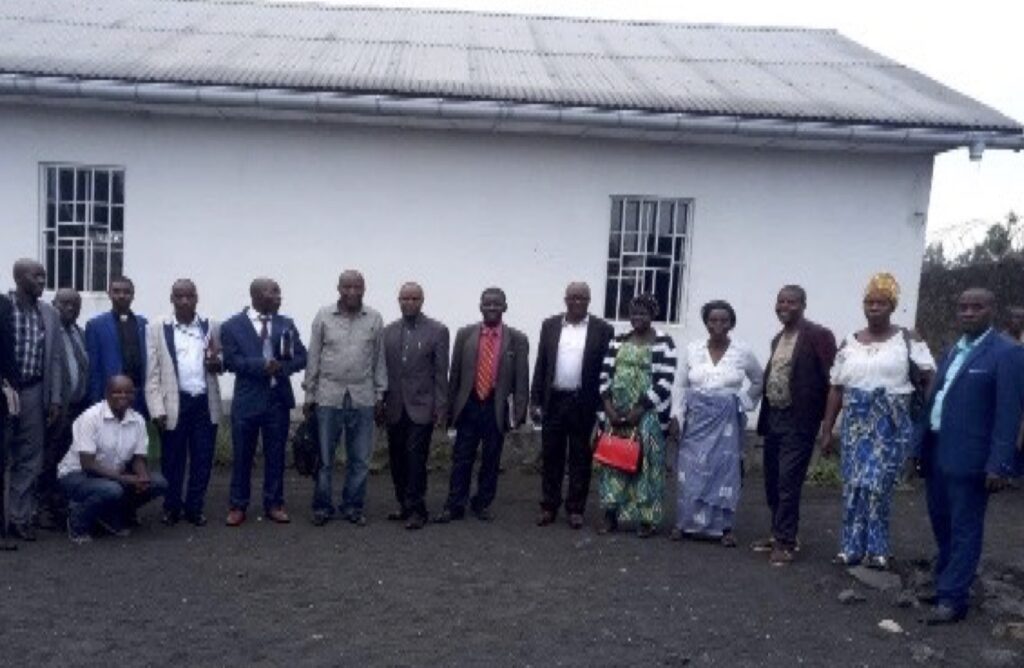by Dr Callum Henderson
How healing and reconciliation retreats are bringing opposing groups together.
The North Kivu region of D.R.Congo is well known for ongoing conflict and unrest, mineral mining, rebel groups and displaced peoples. For a number of years Comfort International’s partners, Comfort Congo, have been hoping to conduct peacebuilding, healing and reconciliation retreats in two of the conflict hotspots – Masisi and Rutshuru. Thanks to a grant from the Southall Trust they have just been able to carry those out.
A total of forty community leaders attended representing nine different tribes who have made up opposing groups in the historical and recent conflicts. Representatives from the police, military, local authorities, schools and churches also attended.
Personal Impact
For some attendees, the personal impact was very great.
One woman announced,
‘I forgive the people who killed my husband during the ethnic war.’
Such a response helps break the cycle of hatred, unforgiveness and bloodshed that afflicts the region.
One man, whose brother had been killed in tribal conflict reported that he had been considering revenge but that he realised he should now‘forgive those who killed him and the way he died.’ As one attendee succinctly said, ‘I have learnt to live with others in our society by avoiding conflict.’ Another lady stated that she ‘pardoned the man who raped me.’
Even church leaders were impacted by the training in a way that showed the need for the church to be renewed in its attention to peace-building. One stated,
‘I am now a follower of Jesus who calls all the nations, all the tribes to live in unity without considering our different origins.’
Another church representative stated, ‘
My former life was confused through tribalism. The retreat has taught me to repent and forgive and build reconciliation.’
Shared Impact
The personal impact is vital in order to create the setting for a shared and community impact. In much of D.R.Congo church choirs are a key social setting for knowledge and opinion transfer.
One church choir leader reported,
‘I have come to realise that I lived in hypocrisy and hatred and I am very sorry to have taken part in those … I have sat in my choir of 32 singers and visited three other choirs to talk about the impact of the retreat and we are organising many visits to reach many singers in our community.’
The shared impact has been remarkable.
A military chaplain stated,
‘this retreat has been the best way to understand and make others understand that we are all called to live in unity.’
This is crucial in a context where the national army is frequently accused of violence and sexual abuse.
The retreat’s training was described by one attendee as being ‘implemented by sharing the teachings on forgiveness and repentance for the purpose of reconciliation … so that all people of all generations and nations can be one tribe beyond the borders of tribalism’. The lady who pardoned the man who raped her was sharing the message of the retreat to ‘unite all the tribes in conflict and put an end to violence.’
Church and Community Impact
The church has a strong influence in the area but has not always been free from tribal rivalry. In turn, this creates the seedbed for divisionism in the wider society and ultimately divisionism leads to conflict and violence. One bishop who attended admitted to promoting his own tribe at the expense of others but concluded that ‘through this retreat, I happened to understand that we are all one.’ After gathering 24 other church leaders he has begun ‘to reach other communities to let them know the time has come to unite the people. We are raising our strength to reach other communities’.
Munyarukundo, a representative of 171 Comfort Congo schools who ‘learnt how to be an ambassador of peace in my family and community,’ met with thirty coordinators and reported,
‘the retreat has taught our community to avoid tribalism and conflict by living forgiveness and repentance.’
Another attendee reported that ‘the retreat has changed the members of the community with the basis of living union,’ and a further reported ‘after the retreat, my community is beyond the barriers of tribalism.’ This was a repeated theme among attendees – that the barriers of tribalism had been broken down through what they learnt and been impacted by on the retreat. One church pastor said he realised that the men and women of the church were ‘a tribe made of new creatures saved by the blood of Jesus.’
All attendees have become ‘Ambassadors of reconciliation’. A police chaplain has already reported that ‘many have been reconciled and live in unity’. Another has gathered a group of people which is ‘developing a strategy … to tell people we are called to forgive in order to build one community.’
We very much hope that the effects of the retreat will multiply and extend and build a people of peace in those two tragically affected areas. Please keep praying for peace in North Kivu through those who attended.
a little can change a life

